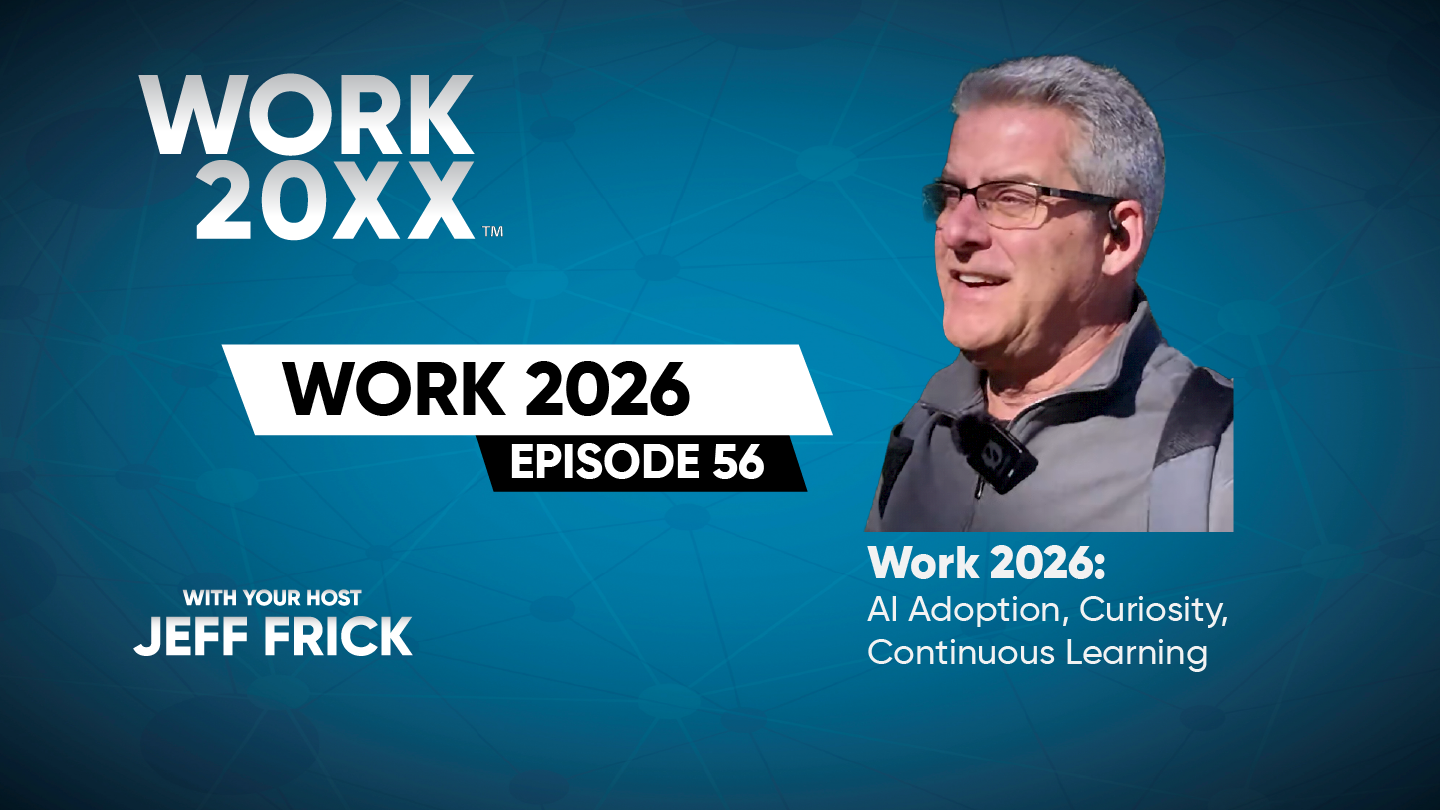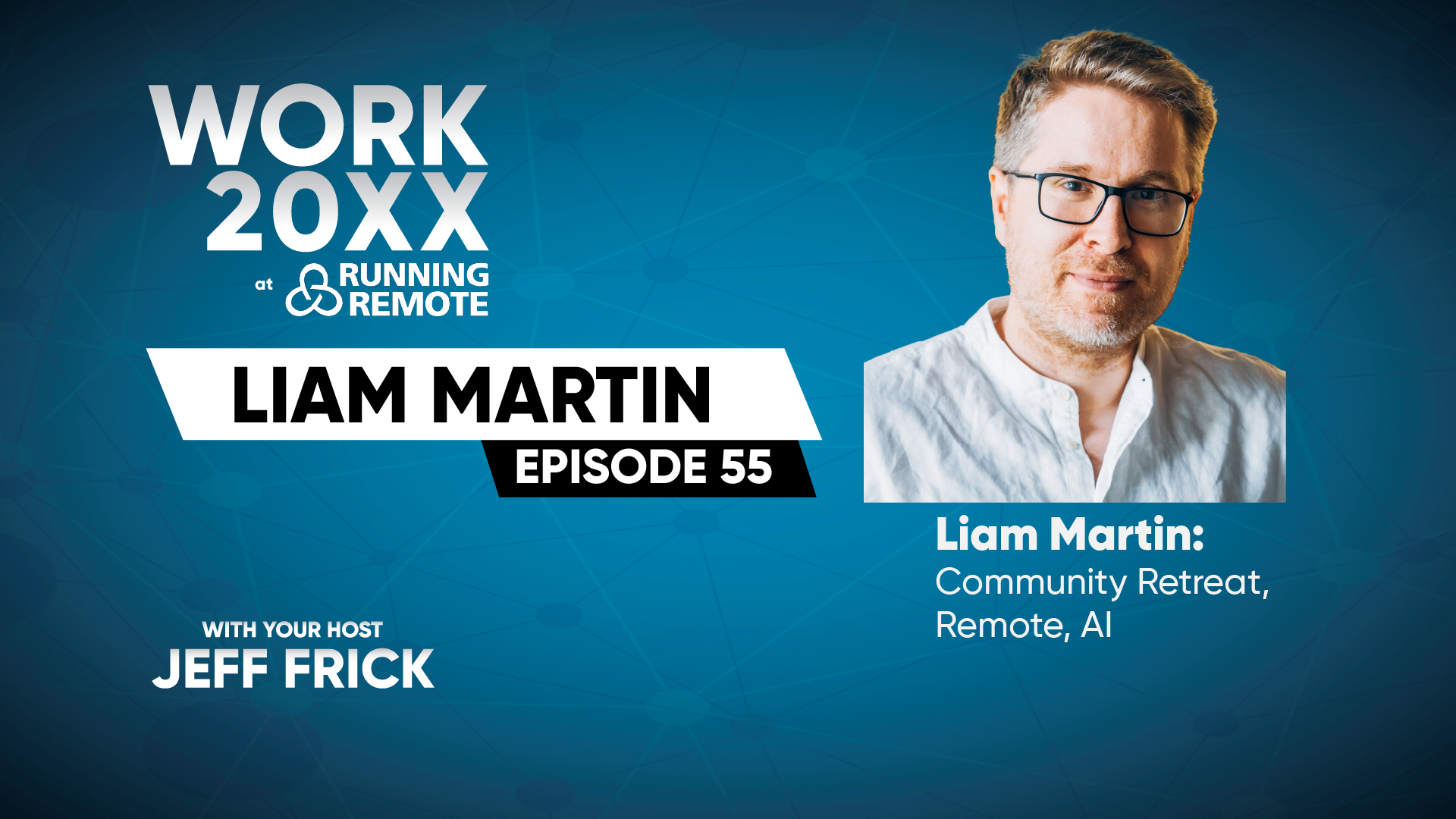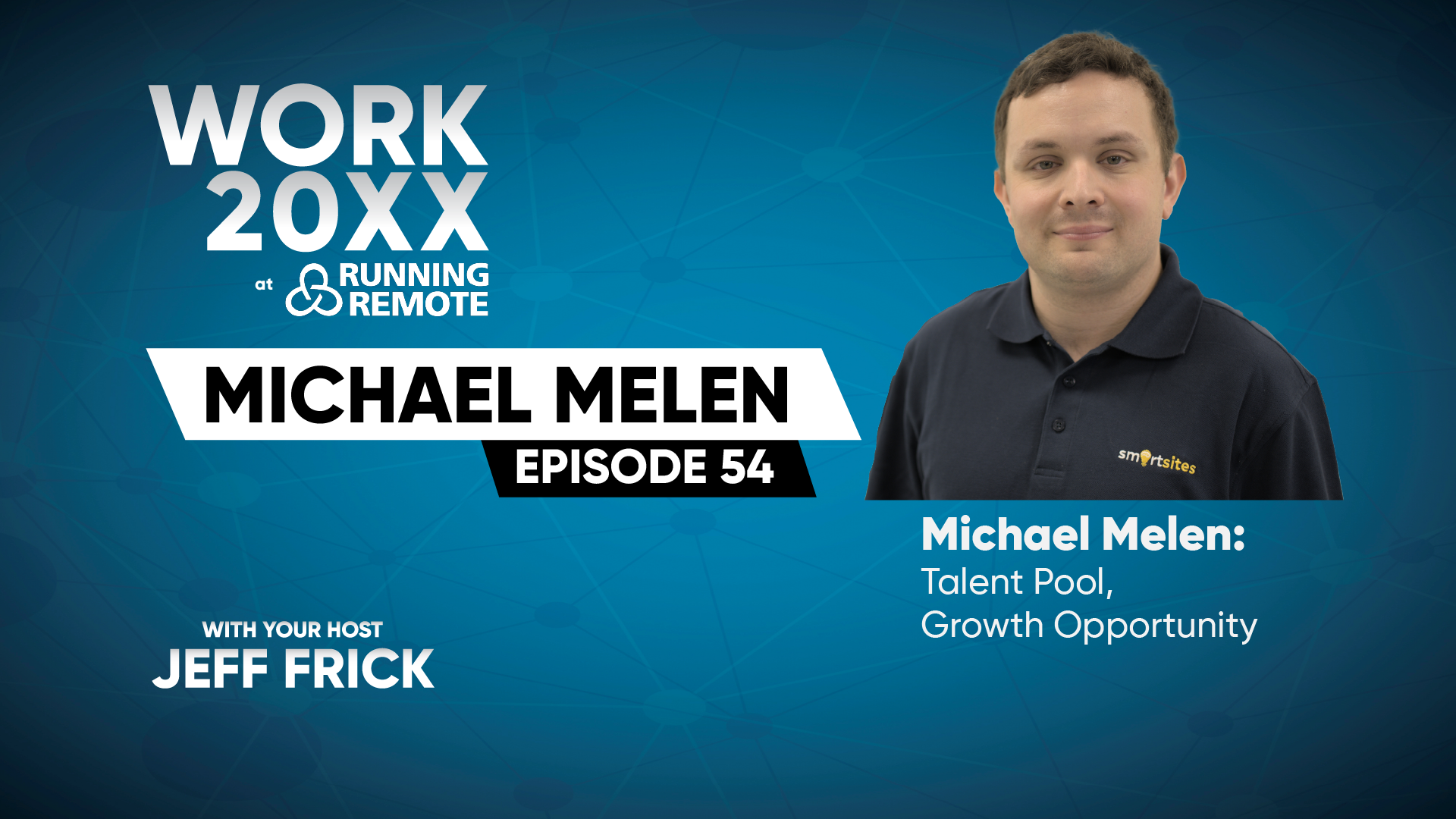Jeff Frick: Digital, Development, Office, Output | Work 20XX Ep13

Jeff Frick: Digital, Development, Office, Output | Work 20XX Ep13
It's episode 13 and I'm a little bit superstitious, not super superstitious. I do knock on wood now and then, and I never mention lack of traffic until I reach my destination, but I'm never quite sure how superstitious the guest might be. So for episode 13, we're just going to go solo. - Jeff Frick
Time for Episode 13, and not knowing the level of superstition with my guests, going solo for episode 13. A quick update on some of the lessons learned through the first 12 episodes, and making a slight course correction as we work through season 2. Also reviewing lessons learned through the first twelve episodes including async, communication, office, meetings, learning, career, hybrid, remote, 1:1s, trust, agency and more.
—-----------------------------------------------------------------------
Episode Transcript
Hey, welcome back, everybody, for another episode of work to come to you from the Home Office today. We're doing something a little bit different, though. It's episode 13 and I'm a little bit superstitious, not super superstitious. I do knock on wood now and then, and I never mention lack of traffic until I reach my destination, but I'm never quite sure how superstitious the guest might be.
So for episode 13, we're just going to go solo. So a quick look back. You know, when we launched this show, Season one, a big shout out to WebEx for helping kick off work Tech sex. We were still in the midst of COVID and clearly the focus was on helping companies and organizations navigate through this hybrid world, really start to think about best practices and asynchronous communication and other things that they could do to do hybrid better.
You know, in season one, we focused squarely on the things to help companies navigate their way through COVID and asynchronous communication, hybrid work, and bringing those best practices really a lot from the remote world into more of a hybrid world for companies that hadn't really focused there before. And as Darren Murph likes to said, you know, remote work forces companies to be good at things that all companies would be good at.
We're halfway through season two and we're starting to shift the focus going forward. We're going to stay focused on communications and async, and it's going to continue to be an important theme. But we want to kind of shift a little bit into continuous learning. And clearly since November of last year in a chatbot and general today I have been at the top of the news cycle, the top of mind for everyone.
And so as we go forward thinking about how people should leverage tools, today's tools and tomorrow's tools, just like a calculator, you know, as as Bill Marlow once said, if your job and your income is dependent on doing square roots, you know, you got replaced by a dollar 99 Casio calculator many years ago that said, these are important tools and the people that know how to leverage them and use them to increase their productivity, to increase their reach, to increase, lots of things are the ones that are going to get ahead.
So there will be a slight shift, you know, as we go forward. Wrapping up season two and heading into season three to talk about continuous learning, career development in leveraging the latest tools like like chatbots. We'll also talk about the evolution of the office. We've had a number of conversations with folks in the commercial real estate business. There's a real reckoning, I think, coming in office, traditional office, especially in the downtown core.
But there's also a real opportunity to redefine what office is. And what we found in the past was that, you know, kind of the open floor plan is really just average. An average doesn't really ever work well for anyone because there's no average person, no one is average. And so we've seen a lot of innovation around, you know, kind of reformatting and rethinking what the office should be around the things or offices excel.
And that's not just sitting in the office and doing Zoom calls or meetings. It's really around collaboration and socialization. And surprisingly for some heads down focus work kind of a library space. And so what we've discussed in the past and will continue to see and evolve going forward as spaces like the new Arlington headquarters that has 75 different types of seating configurations in the same building for different types of work or what people might want to do.
So it's really this kind of activity based focus. So we'll continue to watch this change in the office space and commercial real estate because I think it's going to be pretty transformative. There's going to be winners and losers, but basically, you know, flex space, space is a service and it'll still be in demand because there's you know, there's a lot of things I can't do at home.
I don't want to do at home, or there's just a reason that I want to go. But really, it looks a lot more like a restaurant. It looks a lot more like hospitality. How do you make the office attractive? How do you provide services that I can't get at home? Just like a restaurant? Why do you go to a restaurant?
Because it's something that you don't make at home or, you know, you prefer the experience out at that restaurant. So what can we learn from from those industries? And then on the hospitality side, again, most of the things that people are going to want to do in the office kind of look like an off site. We've said it before, I'll say it again.
You know, the onsite is the new offsite. And what makes a successful offsite a plan, an agenda, objectives, some meetings time, some fun time, some socialization and time, some relaxing time. And really the whole idea is that it's very intentional and purposeful with an objective of why you're together. So as you think about that going forward, we'll continue to explore how, you know, more of a kind of flex on demand services based approach, either within the building, within the individual tenant or what I think we'll see more and more going forward is almost like the ecosystem within the building providing a bunch of these services that then the occupants can get and sign up for as they need them, a podcast studio, a socialization space, an event space. So I think we're going to see more and more of that going forward. Another theme that I think we'll continue to see is this digital first or remote. First is kind of how we started, but Digital first is probably more accurate for most companies and the idea being move as much work as you can to these digital asynchronous platforms and whether that be WebEx, whether that be teams, whether it be Slack, etc. there's a number of them out there.
But the more that you can move work to asynchronous, then what that does is it frees up your synchronous times for things that are more important. What's more important than than status meetings one on ones spend more time in, one on ones with the people on your team. Get to know them better. Help communicate the objectives of the company in the mission and really get to understand what the drivers are for their world so that you can help motivate them and bring them along and help them be active participants in accomplishing the mission that you've defined as a leader.
We'll see more and more of that going forward. Another thing that really is, is kind of a summary of what we saw in season one is in terms of operational norms. And, you know, who comes in, when and when do we come in and why do we come in around some of these hybrid work conversations, try to push the establishment of operational norms is down as far as possible into the group as possible.
Let the group decide when they should come in, how they should come in, the frequency, the objectives. And as far as you can push that down, the better because they should be able to self-organize and work within what works for that group. It also really focuses managers to spend a lot more time thinking about output versus input. And we've seen this over and over again is that before people were judged by their input, how much time did they put in?
Are they there or are they attending the meetings, etc., versus output? You know, what are we trying to achieve? What do we need from people and what type of the timeframe? And then, you know, what roadblocks are in the way that we can help them clear so that they can get their job done better. And really that gets into the servant leadership or some people don't like servant leadership.
Service leadership is another word, but the idea being is rather than to micromanage your tasks. What I want to do is keep you focused on the objective of hand, tell you where I want you to go, not necessarily how to get there, and then use my power, my resources as a leader to move roadblocks. So, you know, what can a leader do to help the people in their team accomplish their task by using their power and leverage and resources, influence money, budget, whatever, to remove roadblocks to help the team accomplish their goal?
It's a little bit different and a lot of people are kind of uncomfortable with it. But really ultimately that's what we're here for. That's what the business is for, is to achieve outcomes and objectives, not to measure inputs. You want to measure inputs in terms of your cost, etc.. But at the end of the day, especially for knowledge workers, you want to worry about outputs.
So really focus in and make sure that everyone knows exactly what we're trying to accomplish, why we're trying to accomplish it, and the tasks that or excuse me, the timeline that we're trying to accomplish in. And if people have a problem with that, it's up to them then to come back to the manager and say, Hey, I got some issues.
Either I don't understand what you want from me or I don't think I'm going to be able to do it on time or to be able to do it on time. You know, I need help on these areas. ABC So that's really kind of this shift in the paradigm, if you will, to kind of what you hear about is service leadership or servant leadership.
Again, we'll continue to focus on communications. I can't stress enough how important I think it is to communicate, communicate, communicate and overcommunicate objectives to stay close to your people, not with lots of weekly status meetings, but really with the one on ones that you're not going to have more time to do because you're going to move more work to asynchronous platform as much as you can.
Meetings can be good. They can be effective if they have an objective. If the people that are in the meeting are engaged and how are they engaged to other engaged in the actual thing. The objective of the meeting is put together for not just showing up for the meeting because I'm on a list and it's every week and I need to be there so that, you know, have a clear agenda, make sure that the objectives are clear, do all the little the hygiene is a lot of meeting hygiene out there.
This is not new information. Most people just don't do it right. We fall into routine. We don't have an agenda. We don't have expected outcomes. We don't give time for people to prep. And, you know, too often we see people are just in back to back to back to back meetings and trying to find a little windows to work in actual work, whether that's really early in the morning or late after the kids go to bed or somehow squeezing in around lunch or when meetings are not happening.
So cut down on your meetings, increase your one on ones, increase the move to a sink, move your operational norms down in terms of the definition and the control, the operational norms down as far as possible. These are going to continue to be important things as we go forward. So with that, I thank you for being along for the journey.
We're coming to the end of season two pretty shortly here for work 20 x six. We've got a couple of great episodes in the can and will be releasing shortly. Season three will be coming, if you're interested potentially in sponsoring work to reach out to me, I think it's a pretty great show. We've built a great audience really within this space and I'm excited to to wrap season two, get episode 13 out the door so we can move back to the regularly scheduled guests like we like to do.
And then season three will be just around the corner. So thank you for watching. Thank you for listening. Please be sure to like and subscribe and share with a friend. It really helps drive the algorithm and it really helps, you know, kind of spread the word or trying to spread the word to help people out. Look forward to engaging with you on social media.
And thanks again for watching. Thanks for listening. I'm Jeff Fricke. We'll see you next time. Thanks for watching and thanks for listening on the podcast. See you next time.
Disclaimer and Discloser
All products, product names, companies, logos, names, brands, service names, trademarks, registered trademarks, and registered trademarks (collectively, *identifiers) are the property of their respective owners. All *identifiers used are for identification purposes only. Use of these *identifiers does not imply endorsement. Other trademarks are trade names that may be used in this document to refer to either the entities claiming the marks and/or names of their products and are the property of their respective owners.
We disclaim proprietary interest in the marks and names of others. No representation is made or warranty given as to their content. The user assumes all risks of use.
© Copyright 2023 Menlo Creek Media, LLC, All Rights Reserved





